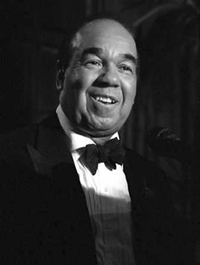By JERRY TALLMER
Bobby Short dies after a lifelong career of singing America’s songs
He was black and I am blue. “I’m white inside,” the great song goes, “But that don’t help my case, / ’Cause I can’t hide / What is on my face… What did I do / To be so black and blue?”
Andy Razaf wrote those words, and Fats Waller and Harry Brooks created the music. It was Bobby Short who first propelled those words, that song, into the awareness of this nominally white New Yorker, one night long ago at the Café Carlyle—Bobby Short, who would fight the lifelong civil-rights fight the only way he knew, or, rather, the only way he chose to—culturally, artistically.
And now Bobby Short is gone. Leukemia took him, Monday of this week, at New York Presbyterian Hospital. As the cliché goes, and for nobody was it ever truer, he was 80 years young.
“Guess who’s in town!” is the way he would begin every show at the Carlyle this past decade or so, standing up at the piano, his hands hitting the keys, his voice detonating in joyous welcome. “I’se in town … We’s in town!”—that meant him, his sidemen, all the people whose works he was singing—Razaf, Fats Waller, Cole Porter, the Gershwins, Harold Arlen, Vernon Duke, Duke Ellington, Irving Berlin, Johnny Mercer, the talent, the class—and the whole packed roomful of generally affluent, socially elect cabaret goers.
Somebody else who plays that room from time to time is a Dixieland saxophonist named Woody Allen. In a movie I love, Woody Allen’s 1986 “Hannah and Her Sisters,” there is a delicious incidental sequence when the Woody Allen character is thrown together with an even more neurotic, uptight individual, Hannah’s sister Holly (Dianne Wiest). On their first date she takes him to a rock concert where the noise and the barbarism drive him nuts. When, out on the sidewalk, she asks him how he liked it, he says, well, maybe he’d prefer music by people who didn’t look like they’d just murdered their grandmother. He takes her to the kind of music he likes—Bobby Short in full fettle at the Club Carlyle. She sits there, blank. Couldn’t be more bored.
It is a very wicked scene, and it’s what Bobby Short really is all about, or was—talent and class. In this moment of Western civilization when various black “artists” of the kind of noise that’s called rap are in fact shooting one another, nothing could be clearer or more pointed. Way back when little Bobby Short, of Danville, Illinois, was a 10-year-old in a tuxedo—or was it white tie and tails?—on stage in Chicago as the “Miniature King of Swing,” he knew what was good in music, and would always be, and what wasn’t.
There was nothing prissy about Bobby Short. He had some very dear women friends, notably Gloria Vanderbilt, who was blackballed by the board of sacrosanct River House for fear that she would bring Bobby onto, or into, the premises; but even if he most likely never went to bed with a woman, he certainly knew where and what was the center of female sexuality, and gave it full appreciation in his rich rendition, as you’ve never heard it before, of the Razaf/Waller “Honeysuckle Rose,” as well as Razaf’s hilariously bawdy “If I Can’t Sell It, I’ll Keep Sittin’ on It,” a quadruple-entendre which is also often in the repertoire of rather large ladies like Ruth Brown.
With all the triumphs of his 70-year career, he was, I think, at the root, a lonely man, and I know from witnessing it that he was hardened to experiences like some drunk full of hostility talking loudly and vulgarly through one of his shows. Indeed, in several interviews I had with him over the years, he more and more indicated how fed up he was with the cabaret life, even if he was the king of cabarets. At every seasonal break he took off for his house in southern France, and stayed there until the new season began. But however fatigued he was, physically and spiritually, the one thing that Bobby Short radiated from the tiny stage (of sorts) at the Carlyle was Energy, capital E. He gave us his all—his relish, his joy, his appreciation, his preservation of the best of another kind of marriage, that of music and, yes, words.
He was always digging up rarities for us, or forgotten gems, and teaching us the history of things—shows, songs, events, lives, manners and mores. One night he started talking about Arthur Tracy, the Street Singer of pre-war radio, and he sang, in the Tracy manner, “The Street of Dreams,” words and music by Victor Young and Samuel Lewis. I afterward told Bobby how deeply it had affected me, and on subsequent evenings he once or twice put it into the performance just for me. As I type out the words, I can hear it now, hear it in Bobby’s soaring timbre:
Love laughs at a king
Kings don’t mean a thing
On the street of dreams…
Gold, silver and gold
All you can hold
Is up there on a moonbeam
Poor, there ain’t nobody poor
As long as love is sure
On the street of dreams.
… and I start crying. My wife Frances is not going to stop crying for quite a while.
Just now the phone rings. It is Maria, at the apartment of Betty Lee Hunt, Bobby Short’s longtime publicist. The word has just come that “at Bobby’s request, there will be no memorial services of any kind.”
However, the Club Carlyle was dark tonight, Monday night, in his memory. Gold, silver and gold, all you can hold, all you can be—black and blue.
I am a camera indeed.
WWW Downtown Express































